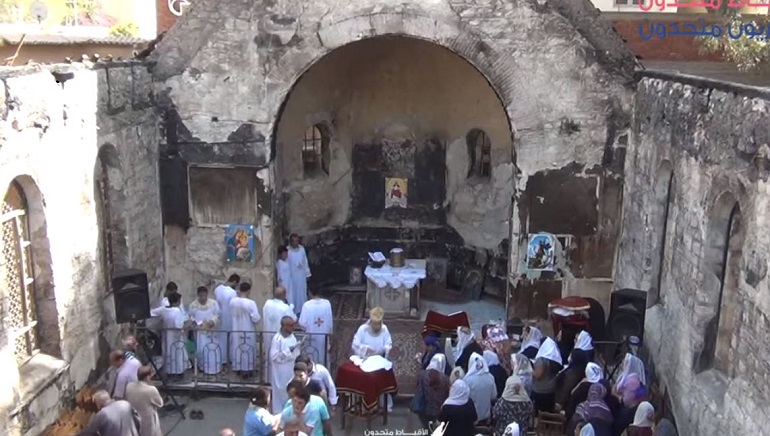
Three Coptic churches in the Upper Egypt region were hit by fires in the last three weeks which, the Copts say, is “not a coincidence”.
On Friday morning 1 November a fire started in an adjacent hall of the Mar-Girgis (St George) al-Gyoushi Church in the Shubra district of the capital Cairo; it was extinguished before causing severe damage and no-one was injured.
However, five people, two of them fire fighters, had been injured in the fire that broke out on the morning of 16 October in the Mar-Girgis Orthodox Church in Mansoura, 120 kms northeast of Cairo, two weeks earlier. The blaze completely destroyed the wooden chapel on the upper floor of the church.
Three days earlier, on Sunday evening, the famous wooden Mar Girgis Orthodox church in Cairo’s southern Helwan district also went up in flames.
In all three cases, investigations are still ongoing, but electrical short circuits are mentioned as possible causes.
But the Copts are not convinced.
Father Samul Mohsen, a priest at the Mar Girgis Church in Mansoura, told World Watch Monitor he was alerted by school girls screaming that the church was on fire. As he lives nearby, he immediately went to check and found “a huge fire erupting in the chapel on the upper floor of the church and the services hall attached to it. The fire started from the wooden ceiling of the adjacent hall”, he said.
Fire and smoke could be seen coming from the roof of the church:
He said CCTV footage showed that something was thrown onto the roof from the vegetable market behind the church. Footage from another camera, taken at the same time, shows the start of a fire in the wooden ceiling of the service hall. The cameras are not directed at ground level and so did not record whoever might have flung something onto the roof.
The wooden chapel on the church’s second floor was built in 2003 and Father Armia Iskandar, a priest at the church – an electrical engineer by profession – said that it was unlikely an electrical short circuit had caused the fire: “When we built the church, we designed the electrical circuits in the best possible way and we make sure to switch everything off when we are not around. Also, the electricity distribution panel is equipped with devices to protect against overcurrent and high voltage rise”.
‘Our loss is great’
The Mar Girgis Coptic Orthodox church in Helwan, the first one to go up in flames, was a wooden structure built in 1898 by the German community and since 1971 used by the Coptic church for worship. “Our loss is great. We have lost a great historical building and we can’t rebuild anything like it,” Father Andrawes Azmy, a priest at the church for 30 years, told World Watch Monitor.
A couple of hours after he had left, locking the building, he received a phone call with the news that it was burning. “I immediately rushed to the church and found it on fire with heavy smoke filling the place. The old wooden building burned down very fast and the fire destroyed everything inside, even before the firefighters arrived,” he said. The church leadership called in electrical engineers to check for signs of a short circuit, but they did not find any.
The next Sunday (20 October) however, the congregation was back for a mass in their burned-out church.
As all three fires are under investigation, police have not so far released further statements.
But a local source, who wished not to be named for security reasons, told WWM that shortly before the incidents, Egyptian national security had asked the churches to check their CCTV cameras to make sure that they were in working order. “This indicates that the national security had information suggesting that some churches in Egypt would be attacked,” he said.
Price tag
In September nation-wide protests erupted, calling for the resignation of President Abdel Fattah al-Sisi because of alleged corruption. He has also been accused of a crackdown on dissent, of jailing thousands of Islamists and activists, including journalists and bloggers.
As Sisi struggled to counter the protests, audio of a leaked phone call was broadcast on Egyptian state TV. The call which had surfaced was allegedly from the Turkish leader of the Muslim Brotherhood, Ali Batikh, to a group member in Egypt. In it, Batikh can be heard warning the group’s members in Egypt to stay away from churches and monasteries as there are plans for attacks on them Critics however have questioned the authenticity of the recording, saying the voice does not match that of Batikh.
Sisi came to power after he ousted the now-outlawed Islamist Muslim Brotherhood and its leader, President Mohamed Morsi, in 2013.
Sisi had the support of the Coptic Church but this has come with a price tag for the Copts, who make up around 10 per cent of the population. “The Muslim Brotherhood has attacked the Copts, their churches and properties, especially in Upper Egypt, to take revenge,” a Coptic human rights activist in Minya governorate, who also wished to remain anonymous for security reasons, told World Watch Monitor. “At the same time [the Muslim Brotherhood] wants to show the international community that Sisi’s government fails to protect Egypt’s Copts and their churches, and they try to make Copts angry with Sisi,” he said.
For father Ephraim Youssef, a priest at the church in Mansoura, it seems clear: both fires are cases of arson, he told World Watch Monitor. “Terrorists change their operations, from bombings to burning. They target the wooden churches that burn quickly”.